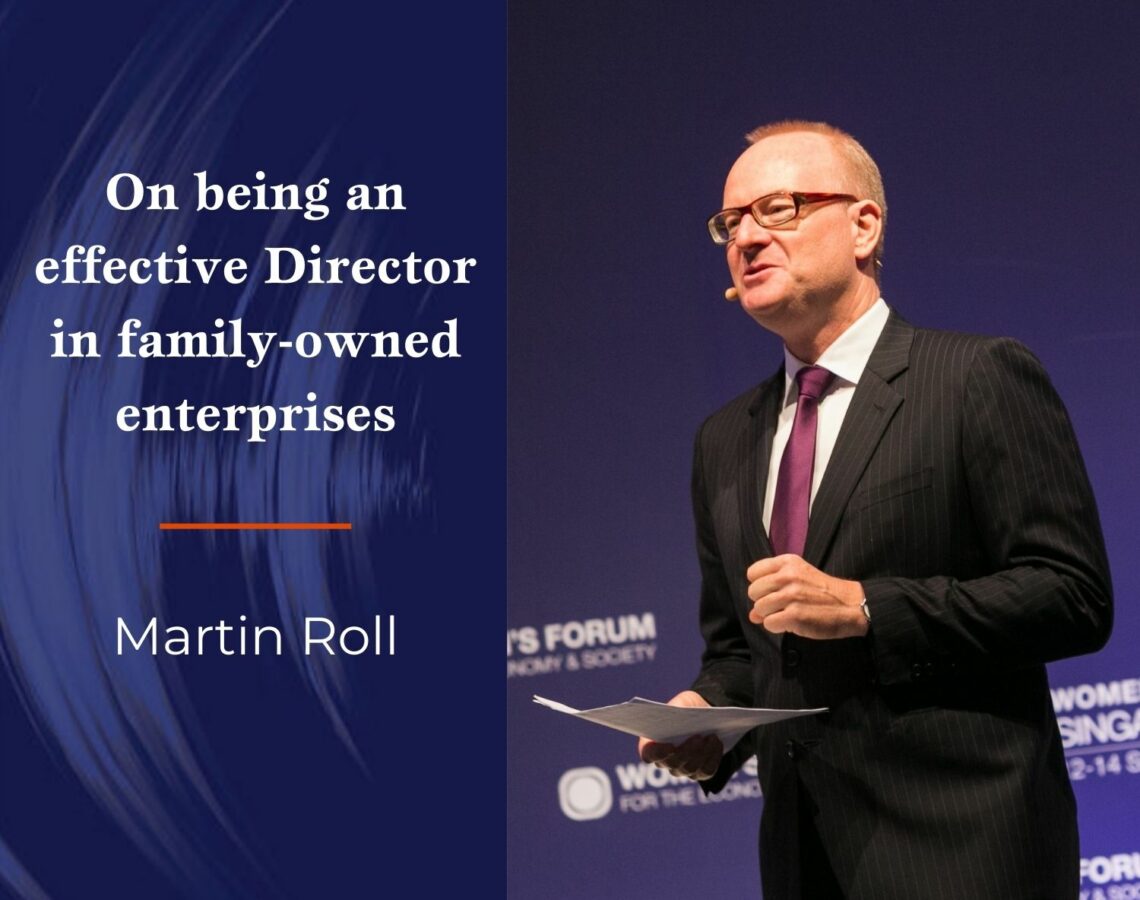On Being an effective Director in family-owned enterprises

So much is written and said about what it means to be an effective Director.
So much is written and said about what it means to be an effective Director. However, most are with listed organisations in mind. We aim to readdress the balance with this three-part podcast series on family-owned enterprises. In the first episode, we looked at “The role of boards in family-owned enterprises.” In this episode, we will focus on how to become an effective Director in family-owned enterprises.
In this podcast, Dr Sabine Dembkowski, Founder and Managing Director of Better Boards, discusses this issue with Martin Roll, a global expert on family business and family office topics and a world-renowned C-level advisor and business school educator. He mentored over 650 Next Generation Family members and understands what keeps them awake at night.
Some of the key takeaways of the conversation include:
“As much as you can observe governance, it’s a little more irrational in nature”
Martin points out that being an independent Director on a family business board is the same as being on a listed board, but a few things need to be viewed very differently. This is because an enterprise owned by a family is frequently one with many emotions involved, as the legacy is at stake, so in many ways, governance is often “a little more irrational.”
An independent Director can add much value here, bringing transferable knowledge, skills, and experiences to the family business board. An independent Director will also need to absorb a great deal. The presence and the influence of the family can be quite substantial, and although there may be other professional outside Directors, there may be many family members. All of the family intricacies and dimensions may be absorbed, but outside Directors should never forget what they bring, stand for, and the impact they can have.
“You need to care for the business family and the legacy”
Martin explains that an outside Director needs to be motivated, enjoy the industry and have the right fit and skills, and have some chemistry with the family. The advice given to the board may be different than a listed business board, as a family business board needs to take a more long-term view because business families often have an intergenerational time horizon. In contrast, on listed boards, the view is weeks, months, or quarters.
However, family-owned businesses think very long-term because they may want to hand over the business to a younger family member, so a generational shift is taking place. Purpose also matters because many family businesses are based on strong beliefs, values, and perhaps even an overarching purpose.
Martin also feels that before joining such a board as an external Director, you really need to understand and identify with the business family and legacy. However, it is not necessary to fully agree with it because the role is to bring an independent view.
“I’ve got a title like God. I’m sitting on the board”
Martin explains that the initial fit of a Director to a family board must be done professionally, with proper due diligence. Governance structure may also differ from a listed organization, with more dotted lines and more subtle informal communication to be navigated. With more emotions involved, external Directors may become more entrenched in family and succession. He cautions that there are possibly also cultural differences, such as gender or status issues (“I got a title like God, I’m sitting on the board”) and informal influence.
“You will very quickly potentially get sucked into family matters”
Martin explains that an external Director brings not only insights into external practices and their own experiences to the table but also high ethical standards and integrity.
With proximity to the family owners of the business themselves, one may very quickly get sucked into family matters, even personal or very intimate ones, so it is necessary to keep the relationship at arm’s length. It may be necessary to say no to the Chair or family members to have the opportunity to remain in a mediation role. Tension arises naturally on any board, but Martin explains that it may be greater on family-owned enterprise boards.
“Be attentive to but not biased by the business family and the business family matters”
Martin makes the point that external Directors may find themselves working for potentially a very wealthy, very influential, maybe even a very famous family – and doing it in the local society, region, or country. This can be intimidating. But an independent Director is independent and must bring an outside perspective.
Family businesses have been very successful, sometimes across generations, but this does not mean that success is guaranteed tomorrow, and renewal of entrepreneurship needs to occur to be competitive.
The three top takeaways from our conversation are:
- Independent Directors bring immense value – governance structures, best practices, industry experience, and a life outside the family business.
- The influence of the business family, the complexity, and sometimes navigating tensions and emotions can be demanding.
- Entrepreneurship is deeply embedded in family-owned enterprises – it is why they are successful, often across generations.
Don’t forget to subscribe never to miss an episode of the Better Boards Podcast Series. Available on Apple, Spotify or Google.
To find out how you can participate in the Better Boards Podcast Series or more information on Better Boards’ solutions, please email us at info@better-boards.com.



